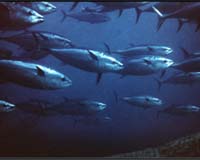 |
Brussels (AFP) Sept 9, 2009 Plans to ban bluefin tuna fishing worldwide, which would throw the huge market for Japanese sushi into turmoil, received provisional backing on Wednesday from the European Union. "This decision marks an important step in the protection of Atlantic bluefin tuna," Environment Commissioner Stavros Dimas said in a statement. "We must act on the best scientific evidence available to us -- and scientists say that urgent action is needed to safeguard the future of one of the ocean's most emblematic creatures." A source said the EU would back a two year temporary ban and so is supporting a bid by Monaco to place bluefin tuna on a list of the world's most endangered species. But a fishermen's association grouping fleets from Cyprus, France, Greece, Italy, Malta and Spain termed the Brussels' stance as "nonsense." According to the proposal put to the UN agency against illegal wildlife trade CITES, tuna stocks are so fragile that the species should be classified as being at threat of extinction. EU member states will examine the "provisional" proposal on 21 September ahead of a CITES vote in Qatar in March 2010. "It will be very important to see what the latest scientific advice says," Fisheries Commissioner Joe Borg added in the statement. He placed the onus on the 48-member International Commission for the Conservation of Atlantic Tunas to explain the latest scientific recommendations, existing data stemming only from 2008. "If ICCAT plays its role efficiently and we can ensure full compliance, a complete trade ban can be avoided," he added. The commission also said it would take into the impact on the fishing industry before seeking majority backing from the EU's 27 member countries. Some 80 percent of Atlantic bluefin tuna fished out of the Mediterranean ends up in the Japanese market. Share This Article With Planet Earth
Related Links Farming Today - Suppliers and Technology
 EU to back temporary bluefin tuna fishing ban: source
EU to back temporary bluefin tuna fishing ban: sourceBrussels (AFP) Sept 8, 2009 The European Union is preparing to back a temporary ban on bluefin tuna fishing which would see the suspension of catches around the world, a source linked to the dossier said Tuesday. The source told AFP, on condition of anonymity, that environment and fishing experts at the EU's executive arm, the European Commission, had reached an agreement to back a ban in the interests of preserving ... read more |
|
| The content herein, unless otherwise known to be public domain, are Copyright 1995-2009 - SpaceDaily. AFP and UPI Wire Stories are copyright Agence France-Presse and United Press International. ESA Portal Reports are copyright European Space Agency. All NASA sourced material is public domain. Additional copyrights may apply in whole or part to other bona fide parties. Advertising does not imply endorsement,agreement or approval of any opinions, statements or information provided by SpaceDaily on any Web page published or hosted by SpaceDaily. Privacy Statement |